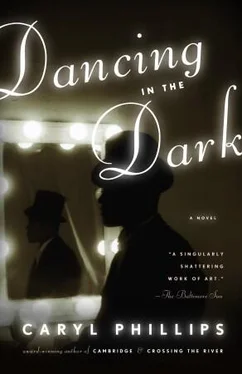“You see, at the age of sixteen I left my Riverside school to join a medicine show. Although my grades were sufficient for there to be talk of my attending Leland Stanford University, where I believe I might easily have found a place and intellectual company, clowning and performing were already a part of my life.” He told this to Lottie while they were courting. He confessed to her that it deeply disappointed his father that his son intended to abandon his studies for something as worthless as the stage, but for five years Bert had grown increasingly separate from other boys, who looked at this tall, queerly accented stranger in their midst and found it difficult to know where or how to place him. He was clearly not one of them, and thousands of miles away to the south and to the east was an island about which they knew nothing, and about which they cared even less. And so a somewhat vulnerable Bert, whose size and slick comic wit had saved him from many beatings, left school and joined a crudely assembled medicine show where buffoonery and desperate clowning were the mask behind which he continued to hide, until his young spirit could take no more abuse and he agreed to become a singing waiter at his town’s famous Old Mission Inn. However, the multiple indignities of this demeaning role also proved too much for him and so, much to his father’s relief, in 1893, the nineteen-year-old colored veteran of the medicine show circuit “retired” from the entertainment business and took a job as a bellboy at the finest hotel in town, the Hollenbeck. The young Negro was expected simply to tote bags, and he was most definitely not encouraged to elicit any laughter. But the silence troubled the gangly teenager, for to perform — this time as a servant — but to receive neither laughter nor applause in return seemed to him to defeat the whole purpose of the exercise, and in his soul the lanky young boy knew that it would be impossible for him to remain buttoned up for long in the uniform of a hotel bellboy.
Eventually he decided that the misery of the Hollenbeck Hotel, where the verbal insults were often compounded by a swift boot to his seat, or a sharp tug at his jacket, or on one occasion being spat upon, seemed on balance to be no worse than life with the medicine shows, and so, when his former employer pleaded with him to reconsider his premature retirement from the entertainment business, he decided to strip off his bellboy uniform and leave the Hollenbeck, and team up with three white boys and try to make a living touring the lumber camps in the northern extremes of the state. These were rough, wild places where boys who sang and danced were a poor alternative to liquor and women, and these untamed men had no hesitation in letting the youngsters know this. The three white boys would go on first, to test the audience, and then all being well Bert would come onstage for the third song-and-dance number, which would usually bring forth a crescendo of hooting and whistling and more often than not a volley of bottles and the crack of a pistol being discharged into the open sky. The crowd regularly descended into a howling pandemonium, with the reeling white men furiously raining coins at the boys, and their enraged voices screeching vile insults, but the four of them would press on with the show knowing that payment was dependent upon their getting through the whole act. A generous camp owner might smuggle them to a hut and give them a chunk of pie and a place to sleep, but they were often shortchanged and simply told to scoot. Thereafter, they would bunk down for the night in the forest and pray that it wouldn’t rain. There were, of course, those nights when his colleagues were offered food and shelter and Bert was left out, but without giving the matter a second thought the three boys stood by him and refused to accept either food or shelter unless the colored boy could share in the spoils. On each occasion the outraged camp owner hastily withdrew his offer to the white boys, which eventually soured the relationship between the four of them for in such dire circumstances it was impossible for the three white boys to hold their resentment at bay. Week after week they struggled from one lumber camp to another, dodging insults and trying to ignore the emptiness in their stomachs. Young Bert began to feel increasingly redundant and responsible, and at night he heard them talking and wondering whose idea it was to bring the coon along as the novelty part of their act. Why had their employer been foolish enough to think that the addition of the tall nigger boy would make them special among the scores of other lumber camp troupes who were parading the northern reaches of the west coast? Bert endured long nights in which he listened as the white boys’ tempers began to fray, and then unity was finally achieved as they fell into fits of laughter and shared with one another crude imitations of Nigger Bert and his heavy languid singing style while Bert lay “sleeping” under the tall, doomed trees of the lumber camp, all the while trying to shut out these noises of betrayal. And then one morning he shared with them the news that he could take no more of the treatment they were all receiving, and he asked if they would forgive him if he returned alone. The three boys stared at him in astonishment. Guilt caught them unawares, and they pleaded with him that he stay and finish what they had started as a team. Their insincere words disappointed him, but he simply let them know how grateful he was for their support, both now and in the past, yet he insisted that it would be best for everybody concerned were he to leave them to tour by themselves. This time there were no objections and nobody tried to make him stay, but Bert knew that it would be difficult for him to return to Riverside and face his father after this latest misadventure. Desperation sent young Bert to San Francisco’s Barbary Coast, where he eventually accepted work as a Hawaiian impersonator singing some of the favorite coon songs of the day, but it was a chance encounter with a member of Martin and Selig’s Minstrel Show that changed his destiny. A jet-black nineteen-year-old boy stood with his banjo working the corner of Market and O’Farrell Streets, hoping that he might find a talent to complement his own. Hoping that he might find an end man. Hoping that he might find a friend.
He first sees George in the fall of 1893. The boy is down on his luck, toes poking out of his shoes, backside hanging out of his pants, but he gives off confidence as he tries to scratch a living on the Barbary Coast. This strange boy, who he guesses to be about the same age as himself, is standing on a street corner clutching a banjo and eyeballing all who pass him by. Bert stares at the little man, who looks as though the word “defeat” has been knocked clean out of his vocabulary, and then it occurs to him that if he too is going to be scraping a living he may as well do so in the company of somebody with whom he might talk. But it is George who takes the initiative and touches the imaginary brim of his invisible hat. “They call me George Walker. I’m from Lawrence, Kansas. How about yourself?” He stares down at the short, black man-boy and begins to laugh, at first quietly, but then he loses the shoulders and begins to roar. “So they call you George Walker?” But his new friend isn’t laughing. He continues to look down at the short man-boy and he wonders just what kind of banjoclutching colored creature he has stumbled across. “I’m sorry, Mr. Walker?” He wipes the tears from his eyes with the back of his sleeve, and then he extends a hand. “Pleased to meet you, Mr. Walker. Maybe the two of us should get ourselves acquainted.”
. . .
An hour later they are still standing together on the corner of Market and O’Farrell Streets. George asks him if he knows where he might smoke out a good end man for Martin and Selig’s Mastodon Minstrels, for he explains that he can’t go back to Mr. Selig until he finds somebody for the other end. Then, momentarily changing the subject, he leans his banjo up against the wall and volunteers the information that he has made his way out west from Kansas, singing, dancing, and suffering all the degradations of the colored road. Apparently Free Kansas wasn’t so free for George, who claims that he arrived in San Francisco penniless, cold, and hungry, but having at least picked up songs aplenty to place on his tongue and having acquired some classy colored strutting for his feet. However, he confesses to having discovered that for a nineteen-year-old colored minstrel boy, the west coast promises little and delivers less, but Bert already understands this.
Читать дальше












